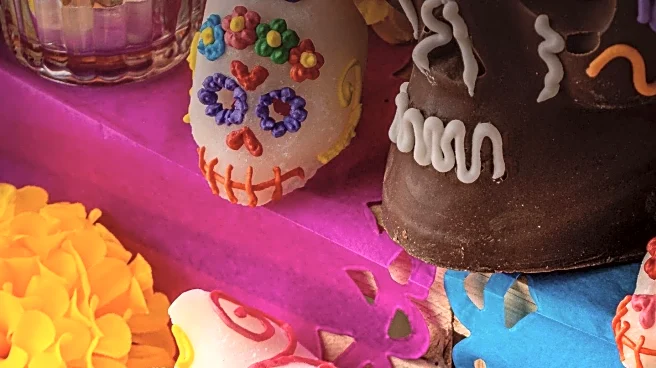What's Happening?
San Andrés Mixquic, a small town near Mexico City, is celebrating the Day of the Dead, a tradition that blends indigenous Mexican customs with European Christian elements. The celebration involves decorating
graves with marigolds, setting up altars with offerings, and welcoming the spirits of deceased loved ones. Families like the Jiménez family prepare altars with flowers, food, and photographs, honoring their ancestors. The Day of the Dead is a deeply personal tradition for many, emphasizing remembrance and gratitude towards those who have passed. Despite modern influences, such as Halloween costumes and parades inspired by Hollywood, the core of the celebration remains rooted in family and cultural heritage.
Why It's Important?
The Day of the Dead is a significant cultural event that highlights the importance of family, memory, and tradition in Mexican society. It serves as a reminder of the rich cultural heritage and the blending of indigenous and European influences. The celebration fosters a sense of community and continuity, as families pass down traditions to younger generations. Additionally, the event attracts tourists, contributing to the local economy and promoting cultural exchange. The preservation of these traditions is crucial for maintaining cultural identity and fostering understanding between different cultures.
What's Next?
As the Day of the Dead continues to evolve, it may incorporate more modern elements while maintaining its traditional roots. The involvement of tourists and the influence of media could lead to new interpretations and practices. Families will continue to adapt the celebration to fit contemporary contexts, ensuring its relevance and sustainability. The Jiménez family, like many others, will pass down their customs to future generations, keeping the tradition alive and vibrant.
Beyond the Headlines
The Day of the Dead offers insights into how cultures adapt and integrate different influences over time. It reflects the resilience of cultural practices and the ability to maintain identity amidst globalization. The celebration also raises questions about cultural appropriation and the commercialization of traditional events, prompting discussions on how to preserve authenticity while embracing change.








